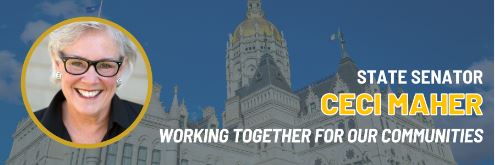| Today, a coalition of Senate Democrats including Senate President Martin M. Looney, Senate Majority Leader Bob Duff, State Senator James Maroney, State Senator Norm Needleman and State Senator Cathy Osten, as well as business leaders including Dr. Kevin Carr, CEO of the National Coordination Center, and Matthew Wallace, CEO of VRSIM, and student advocate Naja Bennett of LiveGirl, gathered in the Legislative Office Building in advocacy of Senate Bill 2, a lead priority for the caucus this year.
Senate Bill 2 reflects and recognizes the importance and burgeoning uses of artificial intelligence in daily life and seeks to both encourage and guide the technology’s use. It seeks to prevent some negative uses of AI, such as deepfake pornography, while promoting others, with support for AI usage in health care and in workforce training, recognizing its transformative potential in any number of industries. Legislators spoke Monday before the Judiciary Committee’s approval of the latest version of Senate Bill 2.
“This bill really consists of three parts with reasonable safeguards – promoting economic development, building an online AI academy in the state of Connecticut and soliciting ideas from state government to use AI to make our services better for individuals and constituents,” said Sen. Maroney. “One of the things most important to note is that AI decisions impact us all. Algorithms are used every day to make important decisions. It’s important when we’re looking at these algorithms to make sure there are not disparate impacts. This is something we’ve been looking at through state and national task forces. We’re not saying not to do these things; we’re saying we need to look at things, make sure they are safe and then release them to the public.”
“I am proud the Judiciary Committee approved SB 2 so it can move to the floor for the full Senate to consider the bill,” said State Senator Gary Winfield (D-New Haven), Senate Chair of the Judiciary Committee. “This legislation will put in place critical protections for all Connecticut residents, especially for our young people, to combat the troubling trend of AI generated deepfake pornography. Additionally, much of the conversation around this technology has been about innovation but not enough has focused on AI’s ability to invent new ways to discriminate. Senate Bill 2 includes important anti-discrimination protections to safeguard people from AI’s biases that are having real detrimental impacts right now in our society. I’d like to thank Senator Maroney for his tireless efforts on this bill.”
“At one point, when I asked for a copy of my credit score, I was shocked to find my credit score was much lower than expected. When I called, I was told that because I use my credit cards frequently, and my debt-to-credit ratio at times was high, the algorithm determined my credit score was lower,” said Sen. Needleman. “I was told ‘the algorithm is my supervisor, you can talk to other people but it won’t fix anything.’ That is not healthy for society. We are living in a very disruptive time, and we need to be aware of the impact this technology has on people, including its having an inequitable impact on people’s lives. We need to make sure we have guardrails. We have to balance our economy and protecting residents from predatory practices and things that can hurt people.”
“As we leap forward with innovation in health information technology, there is always a need to be able to continue to push the envelope,” said Carr. “There are times when that technology moves too quickly, where innovators leap forward without clinical advisors in place to oversee and test algorithms. They were doing it on things important to a lot of us, like cancer treatment and prevention and prior authorization of benefits in health plans. If you look at ways evidence-based medicine is applied today, there’s a rigorous process to provide high quality of care, and when you circumvent that, it’s a huge opportunity but a huge risk. The Hippocratic Oath is vital in health care and there needs to be something that applies to AI as well. This bill supports that.”
“AI is very much ink spreading in water right now,” said Wallace. “It’s influencing everything we touch from Netflix to bank rates. It needs to be thought about; it should not be the social media of the next 10 years. You want to be thoughtful of how we would regulate and to know that impact. Regulation is an important way to avoid unintended impact of technologies. The balancing act of mixing forward-looking technology and keeping it from becoming the thing that eats itself is important. From a business perspective, we like the concept of regulation and certainty, the concept of understanding requirements and guidelines to support our customers and those who buy our product. This will foster growth, not impede it. We need to know what’s going on in a regulatory sense. I give much praise to the lawmakers who are trying to put Connecticut on the regulatory forefront of this. It’s needed, it’s wanted, it’s not going to slow us down; it might make us do a better job.”
“I raise my voice in support of this bill specifically in its protections against deepfake nonconsensual images and videos,” said Bennett, representing LiveGirl, a Connecticut nonprofit focused on creating and supporting female leaders. “It should be noted that 96% of deepfake videos are pornography and nearly all involve women and girls. Imagine waking up and seeing your face on a video you didn’t consent to, or the image of a loved one. We don’t know how far this can go. However, I hope we can take a stand and ensure that this legislation is passed as a protection against this.”
“There’s a lot of money to be made [in AI] but our job is to protect consumers. Back in the 1990s, when the Internet was new, the approach was to be hands-off to protect a burgeoning industry. Since then, consumers have experienced data privacy, social media, listening devices, deepfake porn and more issues where there were relatively few regulatory guardrails,” said Sen. Duff. “Our job here is not to repeat the sins of the past but to put necessary guardrails and parameters around this technology. AI has been used for decades, but we are seeing now that with a thirst for information and knowledge, companies are literally scraping the Internet for information without consumers’ protection or permission. It’s predicted by 2026 that the companies scraping the Internet for information will run out of things to scrape. Next, there will be ‘synthetic AI,’ where AI will create AI. That’s why we’re here today – to put those necessary parameters around the industry. We shouldn’t be afraid of tech, but we also shouldn’t be afraid to put rules of the road in place.”
“This is a highly complex piece of legislation and is absolutely necessary,” said Sen. Looney. “I believe that government regulation is important in places where there is a broad benefit or threat to the public, as we see here. Ultimately, enlightened government keeps our society working. We need to regulate in this area in an informed way that recognizes the complexities. The right kind of algorithm with the right kind of data can lead to the best possible medical treatment, which would be a great benefit; there are also the nightmare sides of AI if it’s not properly controlled, regulated or enhanced. This is something of great hope and promise but also of great threat, and therefore there is a responsibility of government to regulate.”
Caption: Sen. Maroney speaks Monday with Sen. Needleman to his right. |










